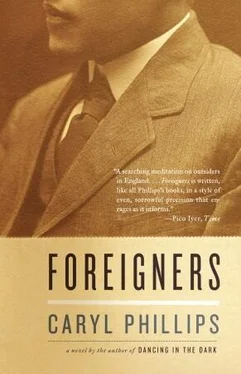Upon her arrival, Francis immediately noticed that Miss Williams exercised considerable influence over his master, for the doctor became a little more careful in his dress, utilising metal buttons instead of twisted hair on his familiar brown suit, and silver buckles occasionally decorated his shoes. However, the influence was limited, for Johnson's wig remained large and greyish, his shirt plain off-white, his stockings black worsted, and he continued to eschew ruffles on his coat so that his white shirtsleeves were generally visible. In short, his master's rugged exterior was still likely to alarm the unsuspecting, and his physical convulsions and general irascibility remained very much in evidence, but Francis continued to feel happy in the company of this kind, if somewhat eccentric, man. However, coping with the daily presence of Miss Williams was proving to be a great trial, for the blind woman made it plain that although Francis might be a clear favourite of her employer, she viewed the Jamaican as little more than an idle black boy who had absolutely no notion of his own modest place in the greater scheme of things. She continually attempted to exercise her authority over Francis, and their rancour was generally uncivil and often bitter. Johnson seemed reluctant to adjudicate, and he habitually allowed Miss Williams to put her oar in and verbally abuse his negro without any attempt on his part to intervene and curb her demanding nature.
Sadly, from the young boy's vantage point, the situation grew steadily worse until finally he could tolerate no more of this peevish woman. With a few pounds safely tucked away in his pocket, and confident of his new-found status as a free man, the negro exchanged his master's household for that of a Mr Farran of Cheapside, an apothecary of modest means, who employed Francis as his assistant. For two years Francis lived with Mr Farran, but he soon understood that he did not enjoy his duties as an apothecary's assistant, finding the work both menial and taxing. During this period Francis did not completely cut himself adrift from his former master, and the young man still visited Johnson, who continued to treat him with kindness and warmth. His former master often suggested that the negro join him for dinner, and the two formed an astonishing spectacle as the doctor slipped a heavy arm around the boy and lumbered his way to a tavern, clutching, in his free hand, a vast oak stick that was six feet in length and of such girth that even the massive hand of Johnson could not completely circle it. Eventually, when Johnson saw that Francis' unhappiness appeared to be incessant, he suggested to the boy that he relinquish his duties as an apothecary's assistant and return to live with him at his new lodgings in Gough Square, for he worried about Francis' frail nature and his susceptibility to illness. However, soon after his return young Francis realised that the miserable Miss Williams' tyrannical hold over domestic matters had not abated and so, determined to make his own way in the world, the sooty youngster resolved to run away to sea.
On 7 June, 1758, sixteen-year-old Francis Barber enlisted in the Royal Navy and was registered in the muster books as 'L. M.' — which identified him as a 'landsman' or a member of a ship's crew who was unfamiliar with the ways of the sea. The young negro boarded The Golden Fleece , which was the tender ship for HMS Princess Royal , and a few days later, on 10 June, the black boy was transferred to HMS Princess Royal which lay at anchor at Sheerness. When Johnson learned that young Francis had once again abandoned his household, but this time run off to sea, he was beside himself with anxiety for he was sure that the boy must have been used wrongly in some vile manner. Initially he feared that his negro may have been kidnapped and pressed on board, or — worse still — disposed of at auction in some coffee house or tavern and become the metal-collared, human property of some conscienceless brute and dispatched back to the West Indies. It was equally possible that young Francis might have become an apprentice to some cockney thief, and Johnson understood that Spitalfields and Whitechapel markets were places where one might buy a poor young child to train as a pickpocket, or beggar, or prostitute, and so he spent many an hour there questioning strangers about his Francis. His enquiries led him to conclude that the sea was undoubtedly the new 'home' of young Francis, and although he now understood that his servant had almost certainly volunteered, he worried constantly about the fate of his boy. It caused him some irritation that Miss Williams seemed to care little that Francis appeared to have exchanged the relative comforts of Gough Square for a life of adventuring, and Johnson's agitation with regard to his servant's new choice of 'career' was further fuelled by the fact that the literary man possessed a particular loathing towards seafaring, being sure that long confinement in a ship served only to narrow the mind as opposed to opening up possibilities of seeing the world anew. He was often quoted as having declared that, 'No man will be a sailor who has contrivance enough to get himself into a jail; for being in a ship is being in a jail, with the chance of being drowned.'
For sixteen long months, Johnson suffered daily anxiety about the moral and spiritual well-being of Francis, who he knew was not a hardy youngster. Information reached him that the boy had transferred to HMS Stag and, unable to endure any further torment, Johnson decided to contact a Dr Hay at the Admiralty and request that an order for the boy's discharge be issued. Months passed by without the order being acted upon, for apparently HMS Stag was spending a great deal of time at sea, albeit in English waters, but finally, on 8 August, 1760, Francis Barber received the unwelcome news that he had been discharged. Unhappy to be so quickly deprived of his new and independent life, Francis loitered about the ship for two whole months before regretfully disembarking on 22 October at Sheerness.
On returning to London, the eighteen-year-old young man discovered that his master had taken slightly more spacious lodgings at 1 Inner Temple Lane, where he had been joined by a strange widow named Mrs Desmoulins, who appeared to be a person of little merriment, and a Dr Levett, a shabby and silent physician to the lower orders. Francis reluctantly reassumed his previous role, busying himself answering the door, running trifling errands, attending at table whenever company happened to call, and fetching an occasional dinner from a local tavern. In addition, Francis was entrusted with the power of purchasing provisions. The greatest joy for the young man was his discovery that Miss Williams had remained behind at Gough Square, where she now occupied herself running a small boarding school. Her blessed absence afforded Francis considerable time to enjoy leisure about the house without being hounded by this wretched woman. However, concerned that the boy's general level of education remained in dire need of improvement, Johnson insisted that Francis keep pace with his studies, and to this end he eventually dispatched his Francis to a modest grammar school at Bishop's Stortford in Hertfordshire that was willing to take him in and attempt to enhance his literacy and speech, and familiarise him with Latin and Greek. Francis was placed in the charge of the late headmaster's widow, who rose to the challenge of this experiment, but the reports that his master received of Francis' 'progress' were, at least initially, discouraging. Johnson soon found himself in the embarrassing position of being the recipient of written complaints about his servant's ineptitude, but he continued to send money and in the end he expended nearly £300. When the young Francis returned to London, Johnson was gratified that his servant could read and write English with improved ease, although not with great fluency, and in addition the negro had indeed been able to add Latin and Greek to his learning. While it pleased Johnson to now have the company of the negro to relax with him by the fire in the evenings, it frustrated him that the young man chose not to ask any questions or put his new education to the service of spirited conversation. But it was enough for Johnson, who described himself as 'a hardened and shameless tea drinker', that he had somebody to sit with him late into the night as he pursued his vice.
Читать дальше











![Unknown - [Carly Phillips] The Bachelor (The Chandler Brothe(Bookos.org) (1)](/books/174132/unknown-carly-phillips-the-bachelor-the-chandle-thumb.webp)
